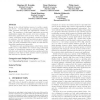Free Online Productivity Tools
i2Speak
i2Symbol
i2OCR
iTex2Img
iWeb2Print
iWeb2Shot
i2Type
iPdf2Split
iPdf2Merge
i2Bopomofo
i2Arabic
i2Style
i2Image
i2PDF
iLatex2Rtf
Sci2ools
SIGCOMM
2009
ACM
2009
ACM
Apprehending joule thieves with cinder
Energy is the critical limiting resource to mobile computing devices. Correspondingly, an operating system must track, provision, and ration how applications consume energy. The emergence of third-party application stores and marketplaces makes this concern even more pressing. A third-party application must not deny service through excessive, unforeseen energy expenditure, whether accidental or malicious. Previous research has shown promise in tracking energy usage and rationing it to meet device lifetime goals, but such mechanisms and policies are still nascent, especially regarding user interaction. We argue for a new operating system, called Cinder, which builds on top of the HiStar OS. Cinder’s energy awareness is based on hierarchical capacitors and task profiles. We e and explore these abstractions, paying particular attention to the ways in which policies could be generated and enforced in a dynamic system. Categories and Subject Descriptors D.4.7 [Operating Systems]: Organi...
Applications Consume Energy | Communications | Operating Systems | SIGCOMM 2009 | Third-party Application |
| Added | 28 May 2010 |
| Updated | 28 May 2010 |
| Type | Conference |
| Year | 2009 |
| Where | SIGCOMM |
| Authors | Stephen M. Rumble, Ryan Stutsman, Philip Levis, David Mazières, Nickolai Zeldovich |
Comments (0)

